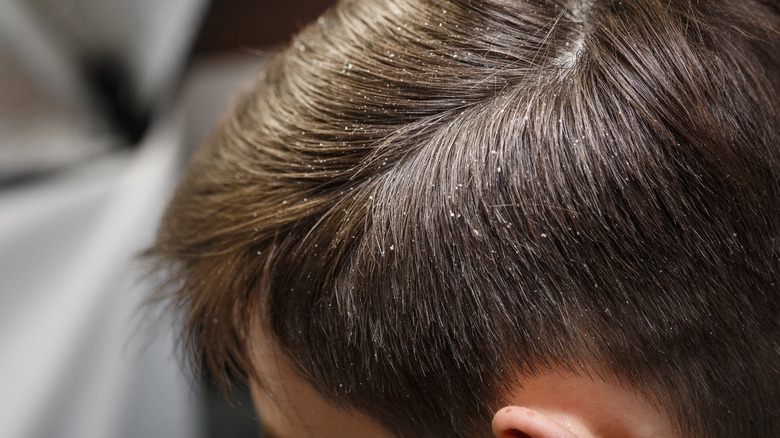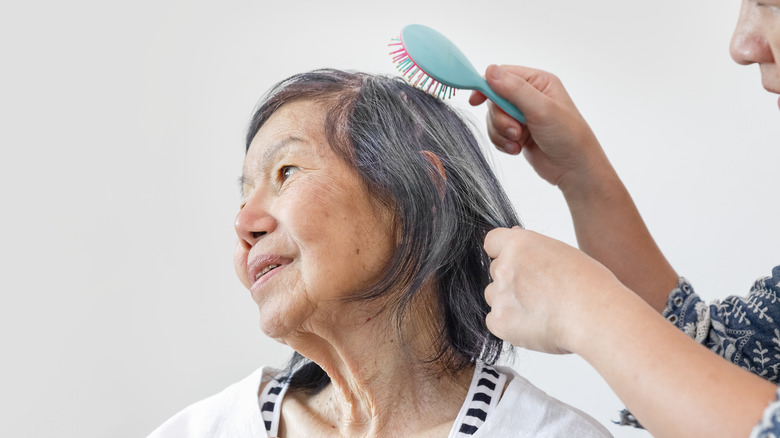Why You Should Add Salicylic Acid To Your Hair Routine
You may be familiar with salicylic acid for your skin, particularly if you're prone to acne, but did you know that it also has benefits for your hair? If you experience conditions like scalp acne, dandruff, seborrheic dermatitis, scalp irritation, oily hair, or simply want to find ways to clarify your scalp and hair, then salicylic acid products may be the missing ingredient from your hair care routine (via Byrdie). Your scalp can become a source for product buildup that can lead to irritation, dry skin, and other unwanted side effects, and salicylic acid hair products can help to remedy these conditions.
Salicylic acid is a comedolytic product, which literally means that it unclogs pores, according to Verywell Health. The first part of the word, "comedo," means pore blockage, and "lytic" means to destroy or dissolve, which together mean that the product serves to fight clogged pores. Salicylic acid destroys acne breakouts, which are often caused by abnormal shedding of skin, by opening plugged pores and allowing the acne-causing blockages of oil, bacteria, dirt, and skin cells to be released. Toners, washes, creams, and other products containing salicylic acid work on your face by helping to shed skin cells in an effective manner. Thinking about using salicylic acid on your hair when breakouts normally occur on your face may sound odd, but there are many benefits that salicylic acid can provide to your locks and scalp.
Benefits of salicylic acid for hair
Just as salicylic acid can rid your pores of excess oil and dead skin cells, it can do the same thing for your hair (per Byrdie). Using a shampoo that contains salicylic acid can provide excellent results if you suffer from dandruff, oily hair, scalp acne, or seborrheic dermatitis. Since salicylic acid can help with the shedding and dissolving of dead skin cells, it makes sense that it's a great solution for dandruff, which is caused by flaky, dead skin. It's also useful for maintaining scalp health in those without any skin conditions, as it can cut through buildup from other hair products and leave you with a clear scalp.
If you're interested in getting rid of excess oil and dead skin cells from your scalp and locks, there are several ways to add salicylic acid to your hair routine. You can try over-the-counter serums, shampoos, pre-cleansers, and scalp scrubs that contain salicylic acid specifically for hair and scalp health (via Byrdie). If you choose to go with a salicylic acid shampoo, it's recommended that you wash your hair with it no more than three times a week and use regular shampoo the rest of the time, unless your healthcare provider advises otherwise. For conditions like psoriasis and seborrheic dermatitis, there are medicated products, including serums and prescription-strength shampoos, that your doctor can prescribe (per Healthline).
Considerations and ineffective uses
Salicylic acid hair products aren't for everyone, though. Healthline warns that products with salicylic acid should never be used on children or babies without a pediatrician's advice. Similarly, people with sensitive skin should be careful when it comes to using salicylic acid products. For some people, products containing salicylic acid can lead to side effects including redness, burning, and increased dryness, breakage, or peeling of skin. If these side effects occur, stop using the product and seek medical attention if the symptoms don't resolve in a timely manner. Additionally, if you have a disease that impacts your kidney or liver, salicylic acid products may be harmful.
There is a lack of scientific research when it comes to salicylic acid and certain conditions, so be mindful of hearsay. It's unknown if unborn babies can be affected by salicylic acid, so if you're pregnant, it's best to stay away from salicylic acid products (via Healthline). Consult with your doctor if you're breastfeeding to determine if it's safe to use salicylic acid. There are claims that salicylic acid shampoos and serums can reverse or cease hair loss, but there currently isn't any research to back those claims. However, salicylic acid products may reduce feelings of itchiness on the scalp, thus leading to less scratching and therefore to a lower risk of hair loss. When in doubt, always consult with your doctor to determine if usage of salicylic acid hair products is right for you.



